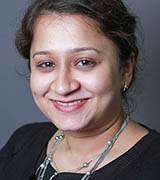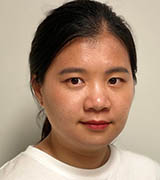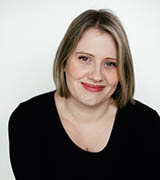The Training Page
FROM THE VISITING FELLOWS COMMITTEE
An Interview with VFC Co-chairs Vrushali Agashe and Zeni Wu
The Visiting Fellow’s Committee (VFC), a subcommittee of the Fellows Committee, serves the interests of visiting fellows (trainees from other countries) in their transition to life at NIH and in preparation for their future careers. The VFC holds events to help fellows adjust to American culture, promote multicultural friendships, and maintain and strengthen connections to their home countries. The NIH Catalyst interviewed VFC co-chairs Vrushali Agashe and Zeni Wu. Their responses have been lightly edited and condensed.

Vrushali Agashe
Vrushali Agashe, who is from India, has been at NIH since 2018. She is a postdoctoral fellow in the Clinical and Translational Immunology Unit in the National Eye Institute. She earned a B.S and M.S. in microbiology from the University of Mumbai (Mumbai, India); and an M.S. in biomedical sciences and a Ph.D. in comparative biomedical sciences from the University of Wisconsin at Madison (Madison, Wisconsin). When she’s not working, she enjoys baking and exploring the Washington, D.C., metropolitan area with its abundance of hiking trails, museums, and excellent restaurants.

Zeni Wu
Zeni Wu, who is from China, has been at NIH since 2019. She is a postdoctoral fellow in the Metabolic Epidemiology Branch in the National Cancer Institute’s Division of Cancer Epidemiology and Genetics. She earned an M.D. degree from Wuhan University (Wuhan, China) and M.P.H. and Ph.D. degrees in epidemiology from the National Cancer Center, Cancer Hospital, at the Chinese Academy of Medical Sciences and Peking Union Medical College (Beijing, China). Outside of work, she enjoys traveling, hiking, and playing basketball and musical instruments.
Why did you choose to come to the NIH?
VA: I met a couple of NIH postdocs during graduate school (University of Wisconsin at Madison)—one at a graduate student-organized networking event and the other at a university poster session. They convinced me to come to the NIH for my postdoc. Also, the incredible research and clinical facilities at the NIH are unparalleled.
ZW: During my Ph.D. training (at the Chinese Academy of Medical Sciences and Peking Union Medical College), I read great papers published by NIH scientists and enjoyed the lectures by NIH scientists (when they visited, at international conferences, or in online courses). I think becoming a fellow at the NIH is a great opportunity.
Why did you decide to run for co-chair of the VFC?
VA: I had the pleasure of seeing some of the VFC events firsthand. On a personal level I also felt that this was a group that I shared a lot in common with. Additionally, I was aiming to develop soft skills (such as learning how to build a team) that scientists are generally not exposed to.
ZW: I think it’s a great opportunity to meet fellows and work with them. In addition to doing my research, I have also learned how to organize events and coordinate with different people. This is an experience that is different from working with a mentor or collaborators.
What do you enjoy about being part of the VFC?
VA: It gives me something to do in addition to research. It also pushes me out of my comfort zone, something that I believe helps you grow and learn.
ZW: Making friends from all around the world and sharing experiences of different countries.
What are some of the unique challenges that visiting fellows have faced during the COVID-19 pandemic?
VA: The biggest challenge was being unable to see family back home. Also, many visiting fellows who live alone felt isolated. I know I did. Living in a 500-square foot studio apartment with no human interaction can be challenging, especially when your closest family might be several thousand miles away.
ZW: During the COVID-19 pandemic, several travel bans have been implemented, so uncertainty around going back home to visit family is a major concern for many visiting fellows. Also, since embassies of some countries are closed, or only have limited appointments, visiting fellows find it difficult to deal with visa-related concerns.
How has the VFC adapted to the COVID-19 pandemic and restrictions on gatherings?
VA: The transition from in-person to virtual events was certainly not easy. Credit goes to each and every member of the VFC who jumped in with their expertise and helped out with virtual events. Although limited in what we could do, the pandemic has opened doors. For example, everyone can attend virtual events and we now have representatives at several NIH campuses including in Baltimore; Research Triangle Park, North Carolina; and Fredrick, Maryland. In the future, we would like to continue to hold virtual events alongside in-person events.
ZW: We continue to organize activities under the physical-distancing guidelines. We have social-networking events and International Movie Nights via Zoom to have fun together. We also organize Science Voices from Home and Brown Bag Seminars. Both types of events provide useful information for fellows’ career development. Most recently, we organized a virtual Division of International Services/VFC symposium to provide the most recent information on travel restrictions and J-1 and J-2 visa-related issues.
What is something that you miss from home?
VA: Apart from my family and friends, the food for sure.
ZW: Friends and food.
What is your favorite American thing you can’t get at home?
VA: The individualistic nature of American society. Coming from a culture where the good of the society and family is put before one’s individual desires, this is a welcome change.
ZW: I enjoy the diversity of the American culture and the way people respect different cultures and beliefs.
What aspect of American culture surprised you or was difficult to adjust to?
VA: When I came to the United States in 2010 for my Master of Science degree, I received a lower grade than expected in my first semester because I did not speak up in class. The concept that you needed to speak up, and that your grade depended on it, was very new to me.
ZW: One example is the health care system. In China, the hospital is usually available for walk-ins and to register to see any specialist on the same day. In the United States, you have to see a primary-care physician first and get a referral to a specialist. I didn’t get used to this for my first six months here.
Do you have any advice for American fellows to help visiting fellows adjust to American culture?
VA: Invite them out for coffee or food or to your Thanksgiving or Christmas dinners. It is also helpful to acknowledge or ask about traditions that are happening in their home country, such as Chinese New Year or Diwali (in India). Remember, food is the biggest commonality—everybody eats.
ZW: American fellows are very nice and always willing to help. They are welcome to attend VFC events and can even become VFC members. It’s a great way to interact with visiting fellows.
To learn more about the VFC go to https://www.training.nih.gov/felcom/visitingfellows2.
To join the Visiting Fellows LISTSERV newsletter (and keep up to date with social events, the Brown Bag Series, Science Voices from Home, and the English Conversation Club) go to https://list.nih.gov/cgi-bin/wa.exe?SUBED1=VISITINGFELLOWS&A=1.
To maintain and enhance connections to home countries, the VFC also hosts country support groups. To find contacts go to https://www.training.nih.gov/country_support_groups.

Erica Wynne-Jones is an Australian visiting postdoctoral fellow in the National Institute of Allergy and Infectious Diseases. She is currently doing a detail in the Office of Intramural Training and Education, where she works on educational programming. She is the Outreach Liaison on the Fellows Committee and is writing for and coordinating fellows’ contributions to the NIH Catalyst Training Page. Outside of work she enjoys cycling around Bethesda, cartooning, writing science-themed satirical articles and sitcoms, and performing stand-up comedy
This page was last updated on Thursday, February 3, 2022
